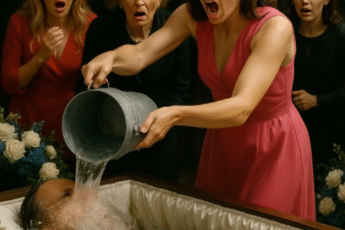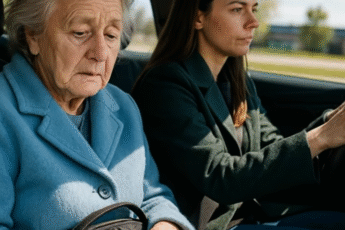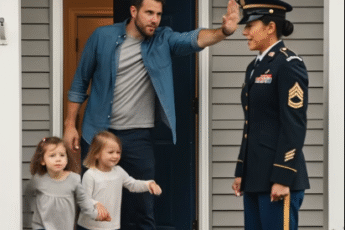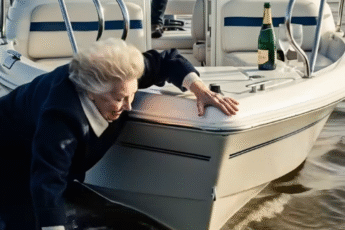The fluorescent lights of the factory floor hummed their final, weary song for the day. But for Lisa, the day was far from over. A power outage at lunch had thrown the production schedule into chaos, and management, with its characteristic lack of empathy, had simply tacked an extra hour onto everyone’s shift. It didn’t matter that some had children to pick up, second jobs to race to, or lives to live.
For Lisa, four lives were waiting.
She had always dreamed of a large, boisterous family, a home overflowing with laughter to fill the quiet corners of her own lonely childhood. When she married Nicholas, she thought she had found a partner in that dream. He was handsome, charming, and seemed to share her vision. His mother, however, saw Lisa not as a daughter-in-law, but as a parasite. Lisa ignored the woman’s barbed comments, focusing on the love she shared with Nick. They agreed on three children, at least. Fate gave them four, when the twin girls, Mia and Maria, arrived.
That was when the foundation of their life began to crack.
Nick’s mother was a constant, dripping poison. “Look what she’s done to you,” she’d hiss at her son, just loud enough for Lisa to hear. “He’s only thirty! He should be traveling, experiencing life! Instead, she’s trapped him with a mountain of children. You think she’s got the brains to give them a real future? Four apartments, four college tuitions? She’s breeding poverty, and she’s happy about it.”
Lisa never fought back. She absorbed the venom, believing her love for Nick was a strong enough shield for them both. She was young, naive, and tragically wrong.
The twins were five months old when Nick came home with hollow eyes.
“I’m leaving,” he said, the words as flat and final as a tombstone.
Lisa’s world tilted on its axis. “Leaving? What are you talking about? Where are you going?”
“Actually,” he corrected, unable to meet her gaze, “you’re the one who’s leaving. You know my parents provided most of the down payment for this house.”
“Nick, have you lost your mind?” Lisa stammered, sinking into a kitchen chair. “What about the children?”
“You’re the one who wanted a big family,” he shrugged, the cruelty of it breathtaking.
“They’re your children too, Nicholas!”
“Lisa, I know everything you’re about to say,” he cut her off, reciting a line that was clearly not his own. “It’s not going to change anything. Mom and I… we’ve discussed it. I’ve made my decision.”
“Your mother?” Lisa whispered, the betrayal a physical blow. “What does she have to do with this? We are your family!”
“I was wrong,” he said simply. “Pack your things. I’ll take you to your grandmother’s old house.”
The bottom fell out of her world. “The old house on Willow Creek? No one has lived there in a decade! It’s falling apart! How can I possibly manage there with four small children?”
Nicholas just shrugged again, a perfect imitation of his mother’s indifference. “Mom and I can give you a little money for repairs. Not a lot, of course.”
It took every ounce of strength Lisa possessed to pull herself together. She looked at her four children—eight-year-old Alex, six-year-old Michael, and the infant twins—and a spine of steel formed where her shattered heart had been. We will not be broken, she vowed silently.
The first few months were a nightmare of dust, leaks, and relentless work. The boys, bless them, helped where they could, handing her rags or watching the twins. Once she had made the house habitable, she filed for child support. And then, the real war began. Nick and his mother descended upon her like vultures, their visits a torrent of threats and abuse. The day his mother sneered that they would take the children from her, something inside Lisa snapped.
“That’s a wonderful idea,” she said with a chillingly sweet smile. “Let them live with their father in his nice, comfortable home. I’ll visit them on weekends. I’d love a break.”
The woman was so stunned she actually recoiled. The threats stopped. They had no interest in the responsibility, only in the control.
Now, three years later, Lisa was almost grateful. The divorce had been a baptism by fire. She emerged stronger, more confident. She had a steady job, a small vegetable garden, and a home filled with love, if not with money. As the twins had just started preschool, she could finally work full-time.
She glanced at her watch and sighed. 7:45 PM. The last bus had left nearly an hour ago. It was a long walk home, but there was no choice. Taxis were a luxury she couldn’t afford. The path led over a pedestrian footbridge that arched over a small river—a shortcut that would save her twenty minutes.
It was on the other side of the bridge that she saw the old woman.
She was perched on a park bench, a solitary figure in the deepening twilight, staring at nothing. Her clothes were a strange collection of what had once been expensive, fine things, now worn to threadbare ghosts of their former selves. There was an air of profound sorrow about her, a vulnerability that called to Lisa’s own protective instincts. She couldn’t just walk past.
“Excuse me,” Lisa said gently. “Are you alright?”
The woman lifted her head, her eyes clouded with a distant sadness. She managed a faint smile. “Yes, I suppose so, dear. Just… resting.”
“Can I help you get home? Where do you live?”
The woman’s eyes welled up with tears, which she wiped away with the back of a frail hand. “I have no one to take me anywhere, child. I live on the street now. I think I had a home, once. But I can’t remember where.”
Lisa was at a loss. “But… what about the police? Social services?”
The woman waved a dismissive hand. “I’ve been there. They tell me to stop drinking and move along. But I don’t drink. Not a drop.”
Lisa’s heart ached. The woman wasn’t brash or aggressive like some of the other homeless people she’d encountered. She was just… lost. A forgotten soul on a park bench. And Lisa, a woman who already had four mouths to feed and a life stretched to its absolute limit, knew she couldn’t leave her there.
“You know what?” Lisa said, making a decision that defied all logic. “Why don’t you come with me?”
The woman looked up, her eyes wide with a fear that broke Lisa’s heart. It was clear she hadn’t seen kindness from a stranger in a very long time.
“Come on,” Lisa insisted, her voice warm. “My name is Lisa. I live just up the road. I’ll introduce you to my children. We’ll have dinner. Please don’t be afraid.”
The fear in the woman’s eyes softened, replaced by a flicker of hope. “But I’m so dirty,” she whispered. “And you said you have children.”
“That’s a problem we can easily fix,” Lisa smiled, taking the woman’s surprisingly delicate arm. “We’ll find you something to wear, and we have a hot shower. Come on.”
The kids, as always, rushed the door when she arrived. “Mom! Who’s this?” Alex asked.
“This, my darlings,” Lisa announced, pausing for a name, “is…”
“Grandma Zoya,” the old woman filled in with a gentle smile. “I’m Grandma Zoya. I got a little lost, so I’ll be staying with your mom for a while, and we’ll help each other out.”
The children accepted this without question. Mia took one of Zoya’s hands, Maria took the other, and they led her to the dinner table. Michael pulled out a chair for her, and Alex set down a clean plate. Half an hour later, Zoya, freshly washed and dressed in a set of Lisa’s spare clothes, sat at their table, a quiet, dignified presence that seemed to instantly belong. She helped Mia with her spoon, her movements natural and loving. For the first time in ages, Lisa finished her own meal while it was still warm.
The next morning, leaving the children with a near-stranger was terrifying. Zoya, who was sitting in a rocking chair mending a sock, seemed to read her mind.
“Lisa, my dear,” she said, looking up over a pair of reading glasses a neighbor had loaned her. “I understand your worry. Go ask your neighbor, Martha, to pop in a few times today. They are children. You must be cautious.”
“You are a very perceptive and kind woman,” Lisa said, her relief palpable. “I think we were very lucky to have found you.”
Within a week, Lisa couldn’t imagine how they had ever managed without Grandma Zoya. She was the calm center of their chaotic home. She told the most enchanting bedtime stories, luring all four children to an early and peaceful sleep. She gently took over the kitchen.
“You come home exhausted and just cook whatever is fastest,” Zoya chided softly one evening. “That’s no way. Children should have memories of delicious food, of a mother’s warm kitchen. Let me handle the cooking. You just give me a list.”
The house began to smell of baking bread and savory soups. Miraculously, their grocery bills went down. Zoya was a magician of economy and flavor.
She also began to tend to Lisa.
“You’re a beautiful woman, providing for your family all on your own,” Zoya said one night over tea. “And yet you shy away from men like they’re monsters. You need to think of yourself, too.”
Lisa just laughed. “What man wants a woman with four children?”
“Four wonderful, healthy, clever children,” Zoya corrected. “That’s not a burden; it’s a testament. Don’t you dare bury yourself alive.”
In those moments, Lisa felt an overwhelming urge to lean her head on Zoya’s shoulder and call her ‘Mom’.
Months passed. It was a period of quiet happiness. But Lisa knew it couldn’t last. Every day, Zoya would remember a new fragment of her past: a trip to the theater with her son, a vacation he had gifted her. It seemed there had been no fight, no terrible argument that had put her on the street. Something else had happened.
One evening, Lisa came home to a strange stillness. The children were sitting silently on the sofa. Zoya was at the kitchen table, staring at a slip of paper.
“Lisa,” she said, her voice trembling slightly. “I remembered. This is my Seryozha’s number. My son. He always made me repeat it, in case of an emergency. You must call him. He must be so worried.”
Lisa’s heart sank, but she took out her phone. Through a haze of static and a few agonizing rings, a man’s voice finally answered, thick with exhaustion and grief.
An hour later, footsteps thundered on the porch. The door burst open and a man, handsome and in his mid-forties with silvering temples and wearing an expensive suit, rushed in.
“Mama!” he cried, falling to his knees in front of Zoya, burying his face in her hands. Lisa could see his broad shoulders shaking with silent, wracking sobs.
His name was Sergey. He was a successful architect who had been searching for his mother for six long months. She had suffered a sudden, severe memory loss while out for a walk and had simply vanished.
The next week, Sergey returned, his car overflowing with gifts for the children. As Lisa bustled around the kitchen, he came to help.
“You are so happy, Lisa,” he said, his voice full of wonder. “It’s a beautiful thing, to have a house full of children.”
“Don’t you have any?” she asked.
He shook his head, a shadow passing over his face. “No. To my great regret. I’ve been married twice. Both my ex-wives preferred parties to parenthood. So it’s just me and my mother.”
“You’re not an old man,” Lisa said gently. “You’re in the prime of your life. You’ll get married again, and you’ll have children.”
“Do you really think so?” he asked, his eyes searching her face.
“I do,” she said with a genuine smile.
Lisa was right. Less than a year later, Sergey got married. And he got children. Not one, but four. He married Lisa.
Their happiness was so complete it felt like a dream. But a snake from Lisa’s past soon appeared on their doorstep. Nicholas and his mother, having heard that Lisa had married a wealthy man, showed up.
“Sergey,” Lisa said that night, her voice trembling after their visit. “My ex-husband and his mother… they’re threatening to sue for custody of the children if I don’t pay them.” She sank into a chair. “You see? I just bring you problems.”
Sergey knelt in front of her and took her hands. “Who are they going to take the children from?” he asked, his voice a low, dangerous growl. “From me? Let them try.” He lifted her chin. “And don’t you ever say such a thing again. There are no ‘your problems’. There are only our problems. We are a family. One whole. Remember that.”
Lisa took a shaky breath. “There’s… there’s something else. It’s not too late to change your mind…” She looked up at him, her eyes wide with fear. “Sergey, we… we weren’t careful enough. In a few months… our family is going to have a fifth child.”
Lisa had never seen a forty-five-year-old man cry with pure joy before. Sergey let out a whoop of laughter, scooped her up in his arms, and spun her around the living room, a man who had lost his mother only to find an entire world.





